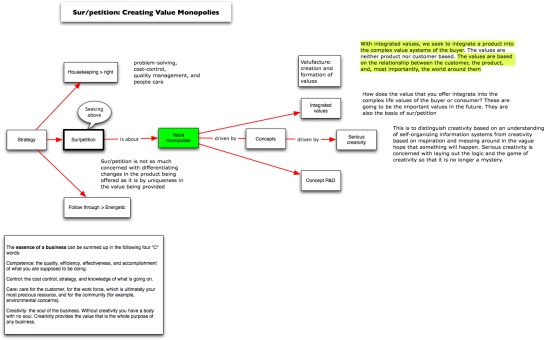|

Amazon link: Sur/Petition: Creating Value Monopolies When Everyone Else is Merely Competing
Introduction
In this book I wish to show that the notion of competition is a dangerous and seductive trap that limits and restricts business thinking.
Anyone involved in running a business needs to move beyond competition to sur/petition.
Competition is a fashionable concept vigorously pushed by such gurus as Michael Porter of the Harvard Business School.
But any business school has to be about ten years behind the times in its thinking in order to be credible.
This is true because its ideas have to be immediately acceptable; since there is a considerable time lag, the ideas of the future are not instantly acceptable.
Therefore, such concepts do not necessarily enhance a school's reputation.
We all know about the global marketplace and that in order to survive you must be competitive.
You must be able to compete with the Japanese, the Germans, and the Taiwanese.
If you cannot compete, you do not survive.
So what is wrong with competition?
The paradox is that you cannot truly be competitive if you seek to be competitive.
The key word here is "survive."
It is, of course, perfectly true that you must be competitive in order to survive.
Giant retailers like Sears have to cut their costs considerably to be able to survive against other retailers such as Wal-Mart with its advanced computer systems and high sales per square foot.
If your costs and values are out of line, you may cease to survive.
But any organization that plans just to survive will sooner or later find itself out of business.
Only those organizations that plan for success will survive, while those that plan only to survive will fail.
So competition is important as part of the "baseline" for survival.
Picture an exotic garden outside Manila in the Philippines.
A scented summer evening provides the perfect setting for a gourmet banquet for the Chevalier de Tastevins.
Flaming torches are set among the bushes.
Costumed waiters carry in the first dish of shellfish on their heads.
Then follows clear soup in large earthenware bowls.
Everyone, myself included, starts to spoon up the soup.
It is very clear soup indeed.
In fact it is not soup at all.
It is plain water served in rather large finger bowls for rinsing the fingers after the shellfish dish.
The mistake is understandable.
Water is necessary for soup—but soup has to be more than water.
In the same way there are many things that are necessary, but not sufficient, for business to survive (for example, cost control), just like water for the soup.
Competition is one of the things that is necessary for business to survive, but it is not sufficient.
A serious mistake that many executives make is to believe that competition is the key to success.
It is not.
Competition is merely part of the baseline of survival.
Success requires going beyond competition to sur/petition.
Sur/petition
There is a serious overcapacity of about 25 percent in European car production.
At one time I was giving a seminar for the British marketing department of Ford, the biggest Ford operation outside of Detroit.
We were discussing competing in the European market.
I suggested that Ford should buy up a company called NCP (National Car Parks), which owned most of the car parks in city centers throughout the United Kingdom.
If NCP became a Ford company, a notice could be placed at the entrance to all city center car parks indicating that only Ford cars could use them.
A car, I argued, is no longer just a lump of engineering.
If your neighbor boasts that his lump of engineering is better than your lump of engineering, you can point out that you can park in the city, and he cannot.
The ability to park is very much part of the "integrated value" of a car if you have to drive in a city.
So is the ability to resell the car, have it serviced, and have it insured.
I have been told, for instance, that it is impossible to insure a Mercedes or a BMW if you live in the Bronx in New York.
It does not matter how good the engineering may be; if you cannot insure a car, you will probably not buy it.
Of course, Ford did not take up my idea.
They said that as an engineering company, it was not their business to buy up car parks.
In the future, some entrepreneurs probably will buy up or build car parks and then get the Koreans to make private-label cars for them.
They will sell, park, insure, and resell cars.
Manufacturing will only be a service to this profit center, and the manufacturing margins will be squeezed.
In the United States, car sales have been in decline for some time.
There has been a five-year slide from sales of 16.3 million in 1986 to about 13.5 million in 1991.
As everyone knows, the classic competitive response has been to slash prices and offer cash rebates.
Surprisingly, competitors do the same.
You may succeed in shifting sales forward in time, but then buyers get used to the rebates and wait for them before buying again.
The suggestion that Ford should have bought up the city center car parks is an example of what I call sur/petition.
The word "com-petition" comes from the Latin and means "seeking together."
It means "choosing to run in the same race."
We could spell it as "(com)petition" to illustrate that all competitors are in the same race.
The word "sur/petition" means "seeking above."
Instead of choosing to run in the same race, competitors choose their own race.
The slash in the new word "sur/petition" is there to indicate the notion of seeking "above," just as ⅔ indicates two over three.
In addition, sur/petition is about creating "value monopolies."
Some ways of achieving a monopoly are illegal, but value monopolies are not.
For survival, you need competition, but for success you need sur/petition and the creation of value monopolies.


Larger view

Contents
- Introduction
- Sur/petition
- Integrated values
- Concepts and creativity
- Valufacture
- The age of contraction
- Format of this book
- A new perspective
- Summary
- What Is Wrong with the Fundamentals?
- Efficiency
- Problem Solving
- Information Analysis
- Competition
- Recent Fashions in Business Thinking
- Cost-cutting
- Restructuring
- Quality Management
- People Care
- Environmental Concerns
- Complacency
- Types of Complacency
- Comfortable complacency
- Cozy complacency
- Arrogant complacency
- Lack-of-vision complacency
- Comfortable complacency
- Comfortable complacency
- Evolution
- Nominated Champions
- Unused Potential
- The Four Wheels of Human Thinking
- Procedures and Routines
- Information
- Analysis and Logic
- Creativity
- Concepts and Information
- Forming Concepts
- Concept and Context
- Sur/petition versus Competition
- Value Monopolies
- Protection or Plus
- The Source of Sur/petition
- Words, Traps, and Dangers
- Competition
- Lumpers and Splitters
- The Same As ...
- Integrated Values
- Benefits of Focus
- The Three Stages of Business
- The Stage of Production
- The Stage of Competition
- The Stage of Integrated Values
- Examples
- The auto industry
- Airlines
- Computers
- Banks
- Food retailing
- Integrated Values
- The Limits of Competition
- Double Integration
- Sur/petition
- Values and Valufacture
- Opportunities
- Value Drivers
- Convenience
- Quality of life
- Self-importance
- Distraction
- Types of Value
- Perceived value
- Real value
- Gateway value
- Context value
- Synergy value
- Security value
- Appeal value
- Fashion value
- Function value
- Convenience value
- Yellow and Green Hats
- People and Values
- Nature of the Values
- Multiple values
- Focused values
- By-product values
- Value Notation
- Serious Creativity
- The Use of Creativity in an Organization
- Does It Work?
- Motivation
- Attitudes
- Focus
- Lateral Thinking Techniques
- Asymmetric Patterns
- Provocation
- Movement
- Not Crazy
- Concept Design
- Level of Concept
- Defined Needs
- The Asset Base
- Concept Extraction
- Sur/petition
- Improving Concepts
- Concept R&D
- Cataloging
- Generating
- Developing
- Testing
- Structure
- The People
- Summary (Key Points)
- Housekeeping
- Sur/petition
- Integrated Values
- Serious Creativity
- The Importance of Concepts
- Concept R&D
- Index

Concepts and Information
What is a concept?
It is almost impossible to define—and almost not worth trying.
But I recognize concepts, look for them, design them, and use them.
Furthermore, there is a distinction between a concept and an idea.
An idea is something specific that you can carry out.
A concept is a more general, abstract notion that has to be carried out by means of a specific idea.
For example, traveling along a road is a concept, but in practice, you have to do something specific such as walk, ride a bicycle, or drive a car.
Contrary to our normal thinking, concepts are often more useful when they are blurred, vague, and fuzzy, because then they have more potential.
If they are too detailed, they cover too little.
If they are too general, they cover too much and provide little direction.
In time, a creative thinker gets a feeling for when a concept is specific enough, yet general enough at the same time.
There is little distinction between a concept and a perception.
When we look out at the world we never see raw data.
The data we receive has already been organized into patterns by previous experience (the self-organizing nature of the mind).
A person born blind who suddenly becomes able to see cannot see.
That person has to learn to see and to build up usable patterns.
This organization into patterns, sequences, or groups we call perception.
Figure 4.1 suggests how we group certain things together to obtain perceptions.
So a perception is a grouping of things realized when we look out at the world.
A concept is a grouping of things realized when we look inwardly at our available experience.
When we have grouped things into a perception, we often put a name on that grouping:
a flower, a mountain, a restaurant.
When we have grouped things into a concept, there is a purpose or benefit that arises from the grouping:
sales tax, traffic control, a restaurant franchise.
A restaurant is both a description and a concept; it sells people food and is a place to eat it.
The purpose and benefit are obvious.

|
![]()

![]()